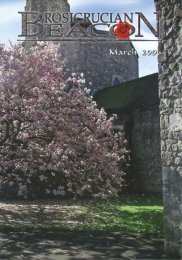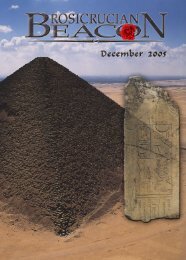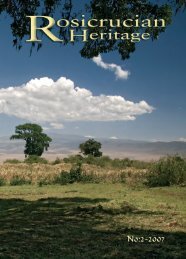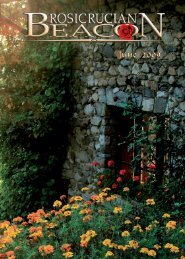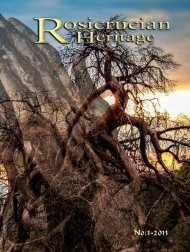Rosicrucian Heritage Magazine - 2011-09 - AMORC
Rosicrucian Heritage Magazine - 2011-09 - AMORC
Rosicrucian Heritage Magazine - 2011-09 - AMORC
Create successful ePaper yourself
Turn your PDF publications into a flip-book with our unique Google optimized e-Paper software.
of those taking part in these investigations discover that<br />
berneath their fears of rejection, loneliness and separation<br />
is a fundamental fear of death..., a fear of losing identity, of<br />
losing the special qualities that make us unique. Without<br />
these special qualities we may fear that we are nothing<br />
at all.<br />
If we believe that all we have is our uniqueness, our<br />
separateness and our fears, when we release them, we may<br />
fear that there will be nothing left..., a complete void.<br />
This is the ultimate terror, and we avoid approaching<br />
the abyss at all costs. If we have sufficient courage and<br />
purpose to meet this terror and pass through the void,<br />
then we may discover the mystical gifts we seek. To acquire<br />
sufficient courage and purpose requires the kind of inner<br />
preparation we gain through the <strong>Rosicrucian</strong> teachings.<br />
In the laboratory, when subjects approach the socalled<br />
“Terror” at the edge of the abyss of nothingness,<br />
their previous preparation can enable them to discover<br />
peace, new life and a love that connects them with all they<br />
perceive. We have found that the experience of connection<br />
is both spatial and temporal. In other words, those taking<br />
part subjectively experience immortality.<br />
Two Different Realities<br />
The subjective nature of this result does not fulfil objective<br />
criteria for proof. The participants may be satisfied with<br />
their experience, but what happened to them may not be<br />
satisfactory proof to others who have not had the same<br />
experience…, nor should it be. However, what these<br />
studies do demonstrate is the presence of two different<br />
realities: one of connection and another of separation.<br />
Connection is accompanied by experiences of love,<br />
peace and joy, while separation is associated with fear,<br />
Accounts of so-called near death experiences are seen by some people<br />
as a substantiation of their belief in immortality.<br />
anxiety, loneliness and limitation. We do not perceive<br />
both realities at the same time. Hence, the reality by<br />
which we live is our choice. Whichever reality we choose<br />
is just that…, a choice rather than a proof. Whether or not<br />
death or immortality ever enters the realm of mundane<br />
science, the judgments and realities about them seem<br />
consistent with results from the <strong>Rosicrucian</strong> Order’s<br />
laboratory subjects. Views of death and immortality are<br />
also remarkably stable with time. For example, the Roman<br />
philosopher Cicero wrote two millennia ago, “There is in<br />
the minds of men, I know not how, a certain presage of a<br />
future existence; and this takes deepest root in the greatest<br />
geniuses and most exalted souls.”<br />
Death and Immortality<br />
Other great people from the past have made comments<br />
consistent with this reality. For example, the American<br />
author Helen Keller “saw” death as illusory. She thought<br />
she saw more clearly by being both blind and deaf: “I<br />
know my friends not by their physical appearance but by<br />
their spirit. Consequently death does not separate me from<br />
my loved ones. At any moment I can bring them around<br />
me to cheer my loneliness. Therefore, to me, there is no such<br />
thing as death in the sense that life has ceased… The inner or<br />
‘mystic’ sense, if you will, gives me vision of the unseen. Here,<br />
in the midst of everyday air, I sense the rush of ethereal rains.<br />
I am conscious of the splendour that binds all things of earth<br />
to all things of heaven. Immured by silence and darkness, I<br />
possess the light which shall give me vision a thousandfold<br />
when death sets me free.”<br />
Even a man like the philosopher Bertrand Russell,<br />
who did not believe in personal survival, strongly felt the<br />
abstract relation between an individual and his world. He<br />
wrote: “...an individual human existence should be like a<br />
20<br />
The <strong>Rosicrucian</strong> <strong>Heritage</strong> -- No: 2, <strong>2011</strong>



